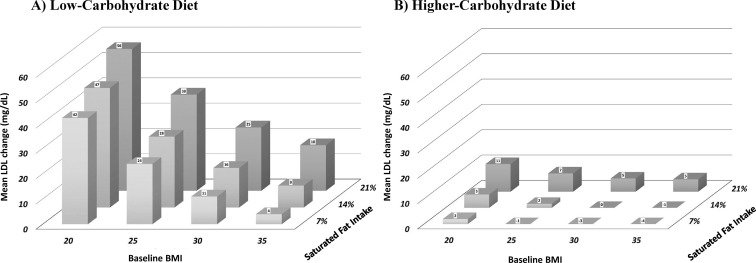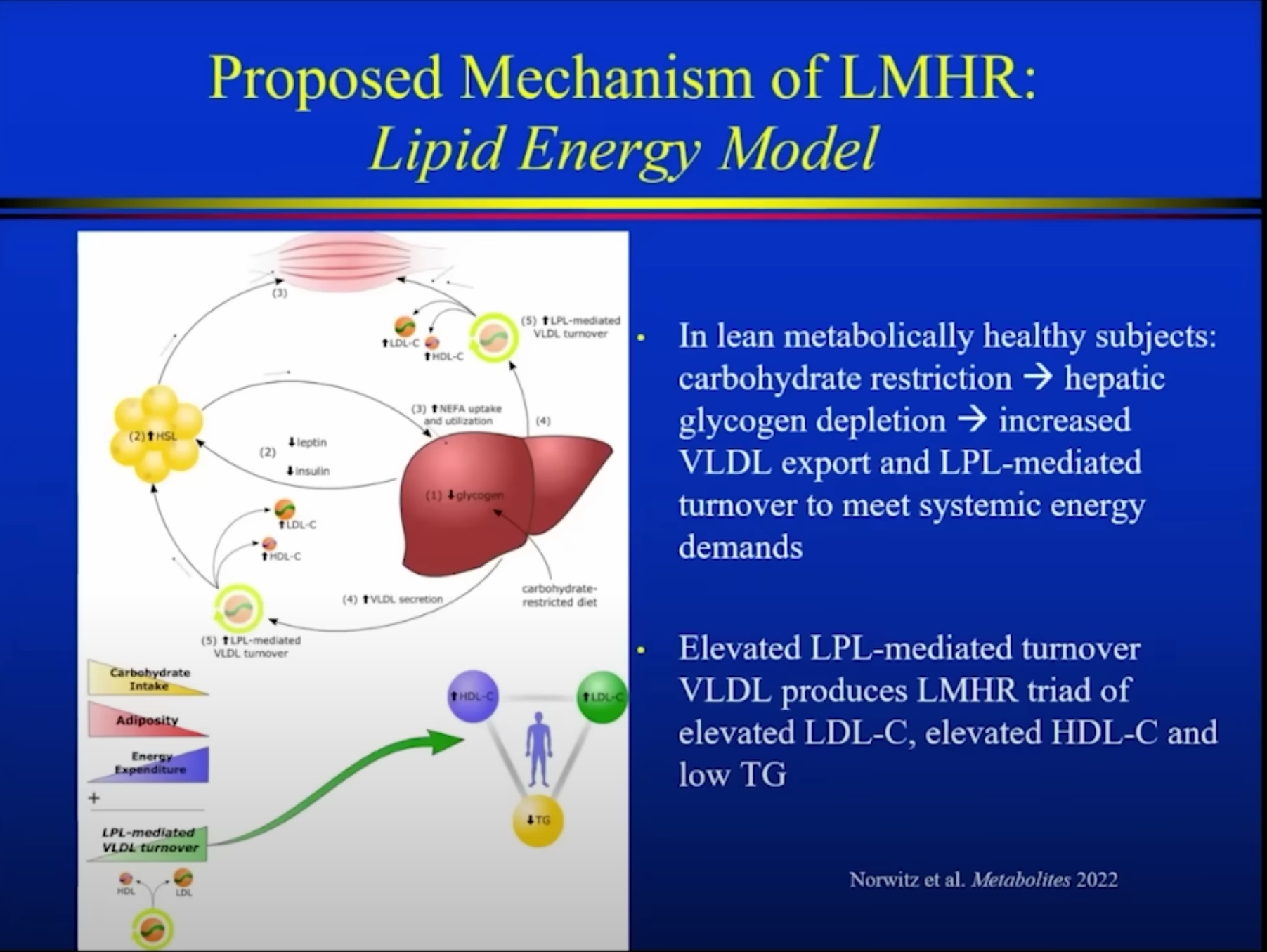Decoding the Effects of Low-Carbohydrate Diets on Cholesterol in People With Different BMI
Disclaimer: The information contained in this post is not intended to diagnose or treat any condition. It should not be taken as medical advice. If you suspect you have a medical problem, consult with your healthcare provider.
On January 17, 2024, a groundbreaking study titled "Increased Low-Density Lipoprotein Cholesterol on a Low-Carbohydrate Diet in Adults with Normal but Not High Body Weight: A Meta-Analysis" was published by Adrian Soto-Mota, Dave Feldman, Nicholas Norwitz, and others. This research provides new insights into the effects of low-carbohydrate diets on cholesterol levels, with a particular focus on low-density lipoprotein cholesterol (LDL-C), commonly known as 'bad' cholesterol. In this blog post, I will explain the study's design and results, which refute the current medical thinking that saturated fat has the most significant effect on raising cholesterol. The authors found that body weight is much more significant than saturated fat. Their findings suggest that we have things backward.
The Low-carb Diet Conundrum
Low-carbohydrate diets have become increasingly popular for weight management and treating various health conditions. However, there is a growing concern about their impact on LDL levels, which are linked to heart disease. Some people who switch to a low-carb diet see drastic increases in both overall and LDL cholesterol. Since we need energy either from carbohydrates or fat, low-carbers have to increase the amount of fat they consume. Doctors and researchers usually blame the higher cholesterol on an increased reliance on fat in diets, specifically saturated fat. The study aims to investigate how these diets affect LDL cholesterol levels, especially in relation to body weight, which is measured by body mass index, also known as BMI.
How the Study Was Conducted
The researchers looked at a range of studies where adults followed a diet with less than 130 grams of carbohydrates per day, which they considered to be low-carbohydrate diets or LCDs. Low-carb diet examples are the ketogenic diet and the carnivore diet. The researchers focused on adults across different BMIs, from lean to obese. The main thing they wanted to find out was how low-carb diets affected cholesterol levels versus diets with normal carbohydrate levels. More specifically, they wanted to see if weight was a factor. As I already stated, their findings were almost the exact opposite of what everyone believes.
The Criteria and Analysis
To get accurate results, the study only included experiments that had specific features: the diets had to be low in carbohydrates, information on carbohydrate intake and participants' body weight (BMI) had to be reported, the amount of saturated fat had to be included, and the diet had to be followed for at least two weeks. The researchers used a sophisticated statistical method to analyze the data, ensuring that the findings were as reliable as possible.
What They Found
Involving 41 studies with 1379 participants, the research showed a fascinating trend: people with lower body weight experienced a significant increase in LDL cholesterol levels when they followed a low-carbohydrate diet. In contrast, those who were heavier generally did not see an increase in LDL, and in some cases, their levels even decreased. Since people with cholesterol problems are universally told to lose weight, these findings are very significant. When doctors find their patients still have high overall and LDL cholesterol after weight loss, their only recourse is to tell their patients to eat less saturated fat, exercise more, and take a higher dose of statins, the medicine that lowers cholesterol. Are we to believe that low-carb diets are good for us to lose weight when we have a high BMI, and then suddenly, when we are lean, they will kill us with heart disease?
Graphs From the Study
The first group of four graphs shows: A) The higher the BMI, the lower the LDL in people eating low-carb. B) Statins had no effect on cholesterol! C: The information submitted by individuals self-reporting their results (IPD) was extremely close to the experimental results. D) Higher-carb diets have little to no effect on LDL levels across different BMI levels.
The next group of two graphs shows A) from front to back, saturated fat increases LDL in people on a low-carb diet. From right to left, lower BMI has a much more dramatic effect on raising LDL than saturated fat in people on a low-carb diet. B) Read right to left, BMI in people on a high-carb diet does not affect LDL, but saturated fat has a small effect, like those on a low-carb diet (read from to back).
The Concept of Lean Mass Hyper-Responders
A key discovery was the identification of a group called lean mass hyper-responders. These individuals, who are generally leaner, showed a significant increase in LDL levels on a low-carbohydrate diet. This response seems to be due to their body's higher reliance on burning fat and an increase in certain processes in the liver related to fat metabolism. For more information on lean mass hyper-responders, read this post.
Discussion and What It Means
The study challenges the usual thinking that LDL increases in low-carbohydrate diets are mainly because of high saturated fat intake. Instead, it points out that a person's body weight plays a more significant role in determining their cholesterol response to these diets. Because of cognitive dissonance, many people will believe that while low-carbohydrate diets might be helpful for people with higher body weight, especially for managing obesity, they are dangerous for leaner individuals. They will never admit that high LDL is not a problem in the context of lean mass hyper-responders. The problem is that the more weight patients lose on a low-carb diet, the higher their cholesterol will go. This is quite a problem.
I believe that high cholesterol may not be a significant risk factor for lean people with no other underlying medical conditions like high blood pressure and high blood sugar. This means that when obese people go low-carb and lose weight, drop their blood sugar and blood pressure, and have more energy, the higher cholesterol is most likely also a good sign. Read this post based on a close relative who had this exact phenomenon. He has lost 22 pounds, lowered his BMI from 25.8 (overweight) to 22.8 (normal), lowered his blood pressure from 110/70 to 100/66, has more energy, lowered his triglycerides from 106 to 71 (lower is better), raised his HDL from 47 to 79 (higher is better), lowered his VLDL by 1/3, rid himself of chronic foot and hip pain, and he has no more leg cramping. But his LDL went from 69 to 192. His doctor was doing everything in his power to convince him to stop doing the exact thing that improved eight parameters of health but made one (LDL) much worse. I say it improved nine parameters. The next section will explain why high LDL with none of the other markers associated with poor metabolism, blood sugar control, and heart disease may not lead to heart disease. It contains a link to a previous post I wrote about the subject.
Understanding the Body's Fat Metabolism
Courtesy Dr. Budoff
The research supports a theory called the Lipid Energy Model that I wrote a post about on December 18, 2023. This theory explains that on a low-carbohydrate diet, especially in lean individuals, the body shifts to burning more fat. This process leads to increased fat breakdown and changes in liver function, resulting in higher LDL levels. This effect is more pronounced in people with lower insulin resistance and those who are more physically active. When compared to a similar group of people in the Miami Heart Study with no heart disease, they did just as well, even with cholesterol as high as 600.
In Simple Terms
In essence, this study tells us that low-carbohydrate diets can have different impacts on cholesterol levels depending on a person's body weight. It's particularly important for lean people, as the study introduces a new concept where they might be more sensitive to cholesterol increases with these diets. This insight calls for more personalized diet recommendations and cautions against a one-size-fits-all approach.
In conclusion, while low-carbohydrate diets may be effective for those looking to manage obesity, leaner individuals with no other medical conditions should be aware of the potential for significant increases in 'bad' cholesterol levels and their tendency to cause their doctor to erroneously convince them that they are harming themselves, when, in fact, they are on the path to better health. Further research is essential to fully understand what these findings mean, especially for lean people using low-carbohydrate diets for reasons other than weight loss. The researchers are currently doing just that. Nicholas Norwitz, one of the authors, lowered his cholesterol while on a low-carb diet by adding 12 Oreo cookies per day. He is in the process of publishing the data. In the meantime, you can see him talk about his experience here.





